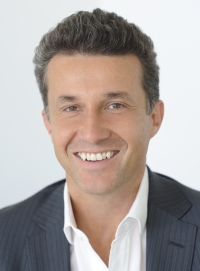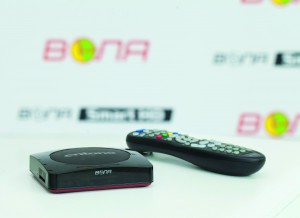
After more than 40 years of operation, DTVE is closing its doors and our website will no longer be updated daily. Thank you for all of your support.
Interview: György Zsembery, CEO, Volia
Volia has taken a major step to realise its ambition to be Ukraine’s leading service provider with the launch of hybrid cable/OTT service Volia Smart HD. CEO György Zsembery outlined the company’s plans to Stuart Thomson.
With the launch of its Smart HD service, Ukrainian cable leader Volia has emerged as a pioneer in the use of hybrid technology to extend the reach of its services and deliver interactive functionality to its existing customers.
Volia launched phase one of the rollout of Smart HD in March. The platform is intended both to target new customers outside Volia’s existing cable network areas and to provide a platform for the delivery of new interactive services, including a more sophisticated EPG, video-on-demand and web-based services from the likes of YouTube, Sony and local content providers Oll.tv and MeGoGo.net.
According to CEO György Zsembery, the former chief operating officer of Hungary’s Invitel, who took over management responsibility at the Kyiv-based operator earlier this year, future plans for the service include the addition of time-shifting – with a backwards-capable EPG to enable network-based DVR – and multiscreen delivery.
Initially, however, Volia launched Smart HD as a way to target users outside its own network areas by offering it as a resale or wholesale service to partner networks. The first of these partner networks, Datagroup, operates residential services under the brand Domashniy Telecom, with approximately 276,000 internet customers in 68 cities across the country.
Volia Smart HD was designed by system integrator Azdio in partnership with Ukrainian system integrator Romsat. Technology for the service is being provided by middleware provider Minerva, set-top provider Entone, conditional access specialist Verimatrix, compression specialist Envivio and OTT technology specialist Anevia.
Zsembery says Volia has two goals for Smart HD. “First, to provide interactivity for our customers. In the Ukraine there have been no interactive services up to now. We have a huge commitment to this because we want to be a leader in innovation,” he says. “The second thing is that we have a network that currently reaches more than three million households, but with this service we don’t have the limitation of our own network.”
For those partner networks Volia can provide an opportunity to bundle TV with other services. According to Zsembery the company is currently in negotiation with over 30 ISPs throughout the country that lack the scale to effectively build and market their own TV packages.
Volia is offering two options: a “classic resale” model where it controls the customer relationship and a wholesale model where the service is branded by the partner network, which will hold the contractual relationship with the customer.
“So far the first model has been more popular and that’s what I would expect,” says Zsembery.
He says Volia will be careful to maintain control of distribution, at least initially, to ensure a uniform level of quality of service.
“We are very conscious that on our network we can control the quality, while on others we can only control only a certain part, so we have to be selective in our partners. It’s not just about striking a good commercial agreement,” he says.
While the service will work over a decent ADSL connection, this means in practice that the majority of deals are likely to be with Ethernet and fibre-based service providers.
Growth by acquisition
Offering its TV service on a resale basis to partner networks is one way that Volia can extend its reach without expensively building out its own infrastructure.
Another is to grow by acquisition, and Zsembery sees the two approaches working in tandem. He says Volia is currently making a major acquisition of a TV or internet service provider at least once a year.
Last year it acquired service provider Odeko, which operated in the western Ukrainian cities of Lviv, Chernivtsi, Ternopil, and south Ukrainian city Zaporizhzhya serving about 160,000 TV and 20,000 internet subscribers.
Zsembery says the target for this year is to acquire a minimum of 50,000-100,000 additional revenue-generating units.
Smaller players, he points out, lack the resources to upgrade their networks and, as a result, “there must be consolidation”.
The Ukrainian pay TV market is extremely fragmented, with the vast majority of subscribers accounted for by the top seven or eight players, and the remainder divided between about 300 local operators. Many operators are believed to under-report the number of subscribers they have, and some retransmit content illegally.
Zsembery says that the launch of Smart HD could help educate the market and encourage a more straightforward way of doing business. He adds that the existence of bad practices by a number of small players also makes it easier for a company like Volia to stand out in talks with content providers. “It helps with education in certain markets and helps us differentiate because there is a huge difference in quality – we are an attractive partner for the content players.”
Zsembery says the market dynamics in Ukraine differ city by city, and this will inform the approach Volia takes with Smart HD. In cities where it has no network presence it will seek to partner with third-party providers, but in the 29 cities where it operates its own infrastructure, and where it is challenged by rival providers seeking to compete directly, it could offer the service as a pure over-the-top play.
Second phase
The second phase of Volia’s Smart HD rollout involves the launch of a hybrid DVB-C/IP set-top provided by Entone that will deliver advanced interactive services over IP to the operator’s existing cable customer base.
This will deliver new services such as an advanced EPG, video-on-demand and catch-up TV and will be marketed as an upsell to existing services.
At the same time Volia is continuing to upgrade its network, launching DOCSIS 3.0-based high-speed internet services, most recently completing upgrades in Zaporizhia, Kirovohrad and Chernivtsi.
Zsembery says he broadly expects between two to three per cent of Volia’s customer base to take up the service over the first year, possibly rising to about 5% after the second year. Initially, he says, the operator knows that many customers will be completely unfamiliar with the concept of advanced interactive services and part of Volia’s task will be to educate them. “In the Ukraine it’s the first time we’ve had interactive services. What we expect is that in the next five years this will transform the market,” says Zsembery. “We decided not to wait [for the market] but to use this tool, with a different business model for different markets, to lead this transformation.”
Both off-net and on-net Volia Smart HD is being marketed as a premium offering. The operator is offering three packages – Start with over 90 channels for the equivalent of ?8, Optimal with over 120 channels for ?11, and Optimal HD, with over 130 channels for ?13.
As far as the platform itself is concerned, Volia plans to enhance the offering with a range of new features. Zsembery says the next stage is to add time-shifting, with a backwards-capable EPG and network-based recording of programmes up to one week after their broadcast, and multiscreen, enabling viewers to switch between devices. Where rights are available, content will be made available on mobile devices including smartphones outside the home. Zsembery says he does not rule out the possibility of a partnership of some sort with a mobile operator.
Zsembery says that none of the service providers against which Volia competes has the ability to deliver a comparable set of services. “In TV we have local competitors but not nationwide,” he says. “Competition is extremely fragmented and there is no other player with the resources or capability to execute this.”
With the launch and planned development of Smart HD, Volia is assertively positioning itself as the undisputed leading multi-play service provider in the market.




